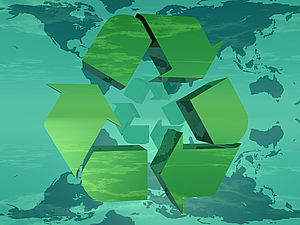
Material Efficiency and Resource Conservation (MaRess)
TOWARD THE OPTIMAL MIX OF POLICY INSTRUMENTS FOR RECYCLING TECHNOLOGIES
Effective recycling systems are central to resource conservation and material efficiency. Recycling transforms waste into a resource that can be reintegrated into production processes. Consequently, the application of recycling technologies will not only reduce pressure on primary resources and the environment but will also create economic value. To achieve these benefits a better framework of policy instruments that create effective incentives for public and private organizations to invest in recycling systems and technologies is necessary.
In order to improve existing policy frameworks it is essential to evaluate the effect of the range of policy instruments that influence recycling systems and the results need to be communicated to regulatory agencies, the private sector and other stakeholders in ways that enable corrective action.
Fostering the diffusion of advanced recycling technologies
As a legacy of differing environmental standards and regulatory models in different regions, technological standards in waste management and recycling systems differ substantially from country to country. There are many examples of advanced technologies that are commonly applied in some regions that have not yet been adopted in other regions and this can reduce the potential for efficient recycling of material and resources. Enhanced trade in advanced recycling technologies will contribute to closing this technological gap.
Corporate, labour and scientific community experience with existing policy instruments
The Material Efficiency and Resource Conservation project - MaRess - explored experiences and perspectives of a broad cross section of stakeholders with current German policy instruments aimed at fostering the export of waste management and recycling technologies. Survey data compiled through the MaRess project suggests that there are weaknesses, strengths and opportunities within the existing suite of export oriented policy instruments in Germany. Dealing with complex information, securing adequate financial resources and support, as well as coping with knowledge gaps regarding cultural differences were identified as the primary barriers to increasing exports of waste management and recycling technology and these barriers were found to be particularly acute for small and medium sized enterprises.
Background
This project was part of the MaRess program led by the Wuppertal Institute with funding support from the German Federal Ministry for the Environment (BMU) and the German Federal Environment Agency (UBA). The aim of the project was to make substantial progress toward understanding core questions connected to increasing material efficiency and conserving resources, including:
- discovering new mechanisms to augment resource efficiency
- developing innovative policy approaches that support material and resource efficiency
- compiling and analysing impacts at the general and economic levels
- monitoring the process of concrete policy implementation

For more information please contact:
Jan Per Bethge • Project Manager
+49 (202) 459 58 15 • jan.bethge@scp-centre.org

For more information please contact:
Michael Kuhndt • Director of the CSCP
+49 (202) 459 58 20 • michael.kuhndt@scp-centre.org
